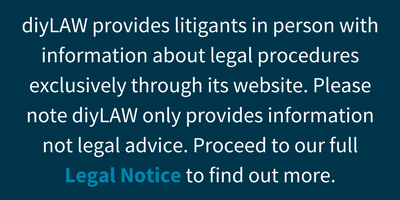Step 4: Initial Steps
Adoption
The course of the adoption process depends upon whether those with parental responsibility for the child consent to the adoption, or whether an application needs to be made to the Court for such consent to be dispensed with.
1) Obtaining the consent of those with parental responsibility
If you have parental responsibility for a child (or will have after his birth) and wish for him to be adopted, then you should contact Children’s Services or an adoption agency to organise this.
If you are the child’s mother then you are not permitted to give your formal consent to adoption until at least six weeks (42 days) after giving birth, although your baby can be looked after by foster parents during this time.
Your consent to adoption (a ‘section 19 consent’) must be given in writing in the presence of an officer of the Court in the form prescribed by s52(7) of the ACA 2002. It must be given unconditionally and with a full understanding of what is involved.
Once this formal consent has been given you may still withdraw your consent at any point until the Adoption Court Order is made, but only with the Court’s permission (1). This permission will only be granted if the Court believes that there has been a ‘change in [your] circumstances’ since you initially gave consent (2). Previous cases have shown that the Court must also believe that you would have a good chance in overturning the decision to move forward with adoption should you be granted leave to remove your consent (3).
A ‘change in circumstances’ does not need to be significant, but it must have happened since you first gave your consent and not be something which was, or could have been, envisaged at that time (4). Decisions as to what constitutes a change in circumstances will be made by the Court in relation to each individual case, based on ‘good sense and sound judgment’ (5). The Court’s chief priority in its considerations will be the child’s welfare, which means that you must be able to alleviate any concerns the Court may have about provisions for the child should he remain with you.
Permission to revoke consent will be granted on a case-by-case basis, which means that there is no certainty it will be obtained. As a result, you should not give your consent to adoption unless you are entirely sure that this is the path you wish to follow.
As already mentioned, if you are the baby’s father but do not have parental responsibility, then your consent is not needed for the adoption to go ahead. This means that if you disagree with the adoption taking place then you should urgently seek to be awarded parental responsibility.
2) Requesting that consent be dispensed with
If you have parental responsibility for a child and refuse consent to the adoption, then the Court may only permit adoptive parents to be found for the child in three specific situations. These are set out in s52(1) ACA 2002. Specifically;
The Court may dispense with needing your consent should you not be able to be found and contacted.
The Court may dispense with needing your consent should you be incompetent of giving consent. This is most likely in cases where you have a severe mental disability.
Most commonly, the Court may proceed with adoption without your consent if it believes that doing so is necessary for the welfare of the child. This means that the Court may only permit your child’s adoption against your will if it considers such a step to be in his best interests.
Where one of the above three conditions are met the first step is an application by Children’s Services to the Court for a placement order. This is the order which permits the local authority to look for suitable adoptive parents for the child before applying for an Adoption Court Order.
Before applying for a placement order, Children’s Services must formally and extensively consider what arrangements would be in the best interests of your child. s1(4) ACA 2002 sets out in detail various matters which Children’s Services must take into account when making its decision. These include whether there is the realistic possibility of your child living with another member of his family (on either side) (6). Only when Children’s Services has made a thorough consideration of all the options open to it will it move to recommend adoption.
The adoption of a child in any of these situations is a lengthy process and one which the Court will only permit if absolutely necessary: previous cases have shown the Courts’ clear preference for keeping together natural families.
1) s47(2) ACA 2002
(2) s47(7) ACA 2002
(3) Re P (Adoption and Leave Provisions) [2007] EWCA Civ 616
(4) In the Matter of J and S (Children) [2014] EWFC 4
(5) Re R (A child) [2014] EWCC B54 (Fam)
(6) s1(4)(f) ACA 2002
13s1(4)(f) ACA 2002








